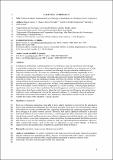Effects of indirect reputation and type of rearing on food choices in chimpanzees (Pan troglodytes)
Abstract
Chimpanzees and humans establish preferences over individuals they may benefit more from through scoring indirect reputation. However, humans prefer prosocial individuals even at their own cost. Giving preference to prosocial reputation over material rewards might have permitted the establishment of cooperative human societies. We tested the evolutionary roots of this propensity: importantly, in our study, the reputation scored had no food involved. Eighteen chimpanzees watched a performance where an antisocial experimenter hit a human victim and a prosocial experimenter interrupted the fight and consoled the victim. Next, the chimpanzees begged food from one of them. In Phase 2, the experimenters offered different food amounts (antisocial + 4 vs. prosocial + 1). Chimpanzees significantly prioritized rewards over reputation (i.e., chose antisocial). In Phase 3, both experimenters offered two pieces of food. Most of the subjects showed indifference to reputation (i.e., chose randomly). Watching fights produced significantly more arousal than consolations. Emotional engagement could not account for chimpanzees’ choices since their choices varied between phases but their arousal did not. Ontogeny and rearing history might play a role in chimpanzees’ choices: the adolescent males (n = 3) consistently chose the antisocial individual whereas hand-reared subjects chose significantly different from mother-reared. We discuss whether the valence of the reputation is species-specific.
Citation
Bueno-Guerra , N , Colell , M & Call , J 2020 , ' Effects of indirect reputation and type of rearing on food choices in chimpanzees ( Pan troglodytes ) ' , Behavioral Ecology and Sociobiology , vol. 74 , no. 6 , 79 . https://doi.org/10.1007/s00265-020-02861-w
Publication
Behavioral Ecology and Sociobiology
Status
Peer reviewed
ISSN
0340-5443Type
Journal article
Description
This study was funded by a FPU12/00409 scholarship from the Ministry of Education of Spain granted by NBG.Collections
Items in the St Andrews Research Repository are protected by copyright, with all rights reserved, unless otherwise indicated.

